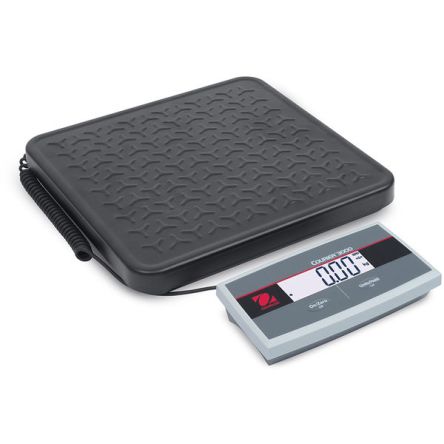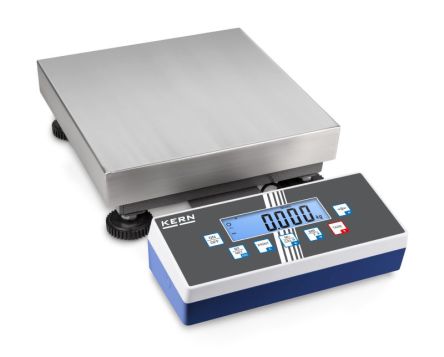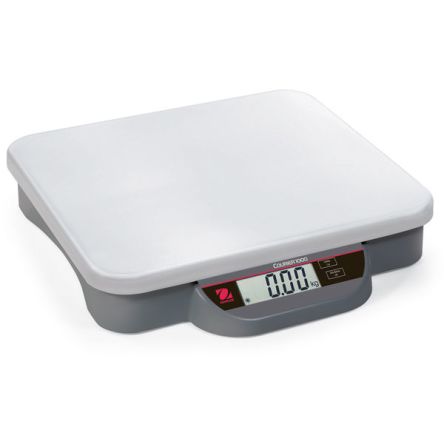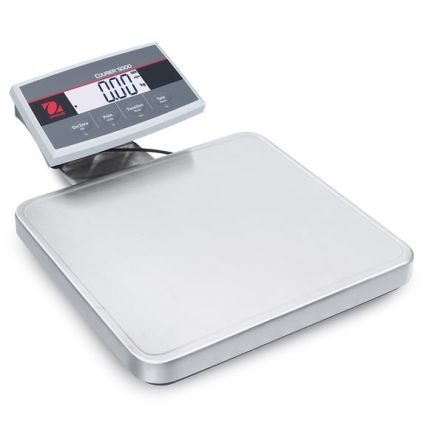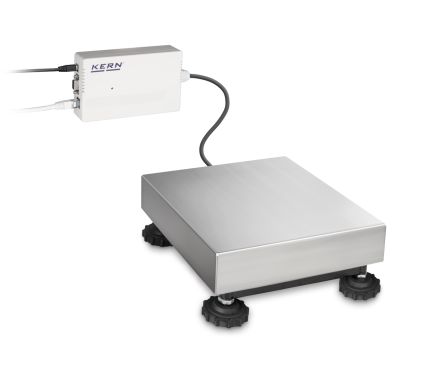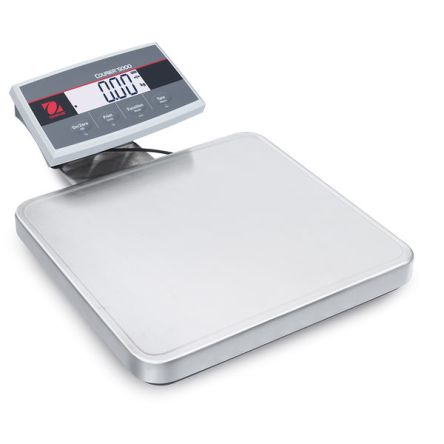- Automation & Control Gear
- Cables & Wires
- Enclosures & Server Racks
- Fuses & Circuit Breakers
- HVAC, Fans & Thermal Management
- Lighting
- Relays & Signal Conditioning
- Switches
- Batteries & Chargers
- Connectors
- Displays & Optoelectronics
- ESD Control, Cleanroom & PCB Prototyping
- Passive Components
- Power Supplies & Transformers
- Raspberry Pi, Arduino, ROCK, STEM Education & Development Tools
- Semiconductors
Weighing Scales
Weighing scales are versatile devices used to measure the weight of single or multiple objects. Commonly employed for weighing smaller objects such as jewellery and food, these devices are essential in various settings ranging from homes and laboratories to industrial environments.
The majority of scales feature a plate or bowl platform on which to place the item to be weighed. There are two primary types of weighing scales: analogue (mechanical) scales and digital scales. Analogue scales use a spring mechanism to read the weight of the item. Digital scales convert the force exerted by the weight into an electrical signal, providing precise measurements. Digital scales are ideal for applications where precision is essential.
Weighing scales provide a reading in a range of different units, for example in grams (g), kilograms (kg), pounds (lbs) and stones (st). Some models offer multiple unit options, so it is important that you choose a device suitable for your application. For further guidance, refer to our comprehensive weighing scales guide.
Analogue or Mechanical Weighing Scale
Analogue weighing scales, also known as mechanical scales, have been a reliable tool for measuring weight for centuries. These scales operate without the need for batteries or electricity, making them a durable and long-lasting option.
When an object is placed on an analogue scale platform, it compresses the spring. This compression moves a pointer along a calibrated dial, indicating the weight of the object. The simplicity of this mechanism makes analogue scales less prone to malfunctions than electronic balances or digital weighing scales.
Benefits of Analogue Weighing Scales
Some of the benefits of analogue weighing scales include:
- Durability: With fewer electronic components, analogue weighing scales are less susceptible to impact or moisture damage. This makes them ideal for workshops, kitchens, or outdoor settings.
- Longevity: A well-maintained analogue scale can last for generations, providing consistent accuracy without the need for batteries or software updates.
- Ease of Use: Simply place the object on the platform and read the measurement from the dial. No buttons, batteries, or complicated interfaces to worry about.
- Cost-Effectiveness: Analogue scales are often more affordable than digital scales, making them an economical choice for basic weighing needs.
- No Power Required: Perfect for locations with limited or no access to electricity.
Digital Weighing Scales
Digital weighing scales offer unparalleled accuracy and a range of advanced features that traditional analogue scales lack. These scales utilise modern technology to provide highly precise measurements.
Digital scales employ sensors that convert the force applied by the object's weight into an electronic signal. This signal is then processed by a microchip and displayed on an LCD screen as a numerical weight reading.
Benefits of Digital Weighing Scales
- Precision: Digital scales offer superior accuracy. This is crucial for applications where precise measurements are essential, such as in baking, medication dosage, or scientific experiments.
- Advanced Features: Many digital scales come with features like tare function (zeroing out the weight of a container), unit conversion (switching between grams, kilograms, pounds, etc.), and hold function (locking the weight reading).
- Easy-to-Read Display: The digital display provides a clear and unambiguous weight reading, eliminating the need to interpret a dial or pointer. This is particularly beneficial in low-light conditions.
- Compact and Portable: Digital scales are often designed to be compact and lightweight, making them easy to store and transport.
Types of Weighing Scales
From precision measurements in laboratories to retail transactions and logistics management, weighted scales play a crucial role in ensuring accuracy, efficiency, and compliance. Weighing scales are available in a wide range of sizes, capacities, and configurations to suit various applications.
Choosing the right type of weighing scale based on specific needs is essential for accurate weight measurements and optimal performance. Common types include:
Bench Scales
Bench scales are compact weighing scales designed for use on countertops, workbenches, or tables. They are typically used for weighing smaller items and materials in various settings, including laboratories, industrial settings, warehouses, retail, and food service.
The advantages of bench scales are:
- Compact Size: Ideal for workspaces where counter space is limited.
- Versatility: Suitable for a wide range of applications across different industries.
- Easy Maintenance: Many models feature stainless steel platforms for hygiene and durability.
- **Additional Features: **Tare function, unit conversion, and data logging capabilities.
Counting Scales
Counting scales are specialised weighing scales that not only measure the weight of objects but also count them simultaneously. This eliminates the need for manual counting and reduces the risk of human error. Counting scales can also provide check weighing against a pre-set weight.
Counting scales are particularly useful for inventory management where they are used for accurately counting large quantities of small parts, components, or products in warehouses and stockrooms. Other applications of counting scales include manufacturing and production and retail.
The standout benefits of counting scales are:
- Increased Efficiency: Significantly faster than manual counting, improving productivity.
- Improved Accuracy: Minimises counting errors, ensuring precise inventory management.
- Cost Savings: Reduces labour costs and losses due to miscounting.
- Streamlined Operations: Facilitates efficient order fulfilment and inventory control.
Hanging Scales
Hanging scales are designed to measure the weight of objects suspended from the scale. The load is attached to the scale using a hook, loop, or strap. These scales are commonly used for:
- Weighing Produce and Livestock: In agricultural settings hanging scales are used for weighing crops, livestock, and animal feed.
- Industrial Applications: Weighing suspended loads in factories, warehouses, and construction sites.
- Shipping and Receiving: Determining the weight of hanging cargo or freight.
- Sporting Activities: Weighing fish in fishing tournaments or luggage at airports.
Crane Scales
Crane scales are heavy-duty hanging scales specifically designed for weighing large and heavy loads suspended from cranes, hoists, or other lifting equipment in industrial settings. They are essential for:
- Construction: Weighing building materials, steel beams, and prefabricated components.
- Manufacturing: Used for heavy machinery, equipment, and raw materials.
- Logistics: Crane scales are essential for weighing shipping containers and cargo for transportation.
- Recycling: Weighing scrap metal and other recyclable materials.
Pocket Scales
Pocket scales are small, portable weighing scales designed for on-the-go use. They are often compact enough to fit in a pocket or purse, making them ideal for:
- Travel: Weighing luggage to avoid excess baggage fees at airports.
- Outdoor Activities: Weighing camping gear, hunting equipment, or harvested crops.
- Hobbies: Weighing small items for crafts, jewellery making, or collecting.
- Discreet Weighing: Weighing small quantities of valuable materials or ingredients.
Industrial Applications of Weighing Scales
Weighing scales are indispensable tools across a wide range of industrial sectors in Malaysia, playing a vital role in ensuring accuracy, efficiency, and safety in various processes. Here are some key industrial applications of weighing scales:
Discrete Manufacturing
Discrete manufacturing involves the production of distinct items, such as automobiles, electronics, or machinery. Weighing scales are essential in this sector for:
- Inventory Control: Accurately weighing raw materials, components, and finished goods.
- Production Processes: Weighing ingredients for precise mixing, batching, and assembly.
- Shipping and Receiving: Determining the weight of goods for packaging and transportation.
Process Manufacturing
Process manufacturing involves the continuous production of materials, such as chemicals, pharmaceuticals, or food and beverages in Malaysia. Weighing scales play a critical role in:
- Formulation and Batching: Precisely weighing ingredients and raw materials.
- Filling and Packaging: Accurately filling containers with the correct amount of product by weight.
- Inventory Management: Tracking the weight of raw materials and finished goods.
Energy & Utilities
Weighing scales are crucial for ensuring efficiency and safety in the energy and utilities sector. Key applications include:
- Fuel Management: Accurately weighing fuel deliveries and consumption.
- Emissions Monitoring: Weighing emissions byproductsto track environmental impact.
- Waste Management: Weighing waste materials for disposal, recycling, or further processing.
Facilities & Intralogistics
Weighing scales are essential for efficient material handling and movement within facilities and warehouses. Key applications include:
- Shipping and Receiving: Weighing incoming and outgoing goods.
- Order Fulfilment: Weighing items for picking, packing, and shipping orders.
- Overload Prevention: Preventing overloading of forklifts, conveyors, and other equipment.
Maintenance and Calibration of Weighing Scales
Weighing scales are used regularly which could mean the level of accuracy drops over time. This can happen due to a variety of factors, including general wear and tear, accidental overloading, shock from drops or impacts, and even the buildup of dust and debris.
It is important that your scales give accurate readings and one way to ensure this is by calibrating your scales. RS Malaysia offers a calibrated option at initial purchase stage and a yearly calibration service all to RSCAL standard.
Regular calibration is vital for maintaining accuracy and ensuring compliance with industry standards and regulations. Accurate measurements also minimise costly errors, ultimately improving product quality and customer satisfaction.
To maintain the accuracy of your weighing scales over time, handle them with care and avoid dropping them. Regularly clean the weighing platform to prevent the buildup of dust, debris, or sticky residue that can interfere with measurements. Store your scales away from extreme temperatures or humidity. It's also crucial to avoid overloading your scales, as exceeding the maximum capacity can affect accuracy.
How to Select the Right Weighing Scale
Choosing the right weighing scale is crucial for accurate measurements. Consider these key aspects:
Accuracy and Precision
Define your requirements by determining the level of accuracy necessary for your application. High-precision weighing scales are essential for laboratory work or pharmaceutical measurements, while less precise scales may suffice for general weighing tasks. Keep in mind the acceptable margin of error for your specific application and choose a scale that meets those tolerances.
Weighing Capacity
Assess the maximum weight you need to measure. Identify the heaviest item you plan to weigh and select a scale with a capacity that comfortably exceeds this weight. Avoid overloading the scale, as doing so can damage the device and compromise its accuracy.
Readability and Display Options
Consider the readability of the scale, especially when observing the smallest weight increment it can measure. Choose a display type that suits your working environment, such as a digital display for low-light settings. Also, verify that the scale supports the required unit of measurement, whether grams, kilograms, pounds, or ounces.
Durability and Build Quality
The environment in which the scale will be used plays a significant role in your selection. Choosing a scale with appropriate protection against dust, moisture, or corrosive substances. Look for weighing scales made from durable materials like stainless steel or high-quality plastics. Inspect all parts of the scale for build quality, including its platform, housing, and internal components.
Calibration Requirements
Determine how often the weighing scale needs to be calibrated based on industry regulations, internal quality standards, and how frequently you will use it. It’s advisable to choose a scale with a convenient calibration method to ensure ongoing accuracy.
Trusted Weighing Scales Manufacturer, Supplier & Distributor in Malaysia
RS is a leading provider of weighing scales in Malaysia. Whether you require a basic weighing scale or electronic balance for everyday use or a high-precision instrument for lab applications, RS has the perfect solution for you.
RS collaborates with renowned weighing scale manufacturers to bring you the best-in-class products from top brands like RS PRO, Kern, Adam Equipment Co Ltd, and Ohaus Europe GmbH.
Our selection of weighing scales includes affordable options starting from RM 110 for basic scales, while high-precision lab weighing scales can range up to over RM 18,000.
Buy Electronic Weighing Scale Online from RS
Discover a wide range of top-quality weighing scales, pressure gauges, and flow sensors from trusted brands, all at competitive prices. Browse our online selection today and find the ideal weighing scale to meet your specific requirements. For detailed information about our delivery options and estimated delivery times, please visit our delivery information page.
